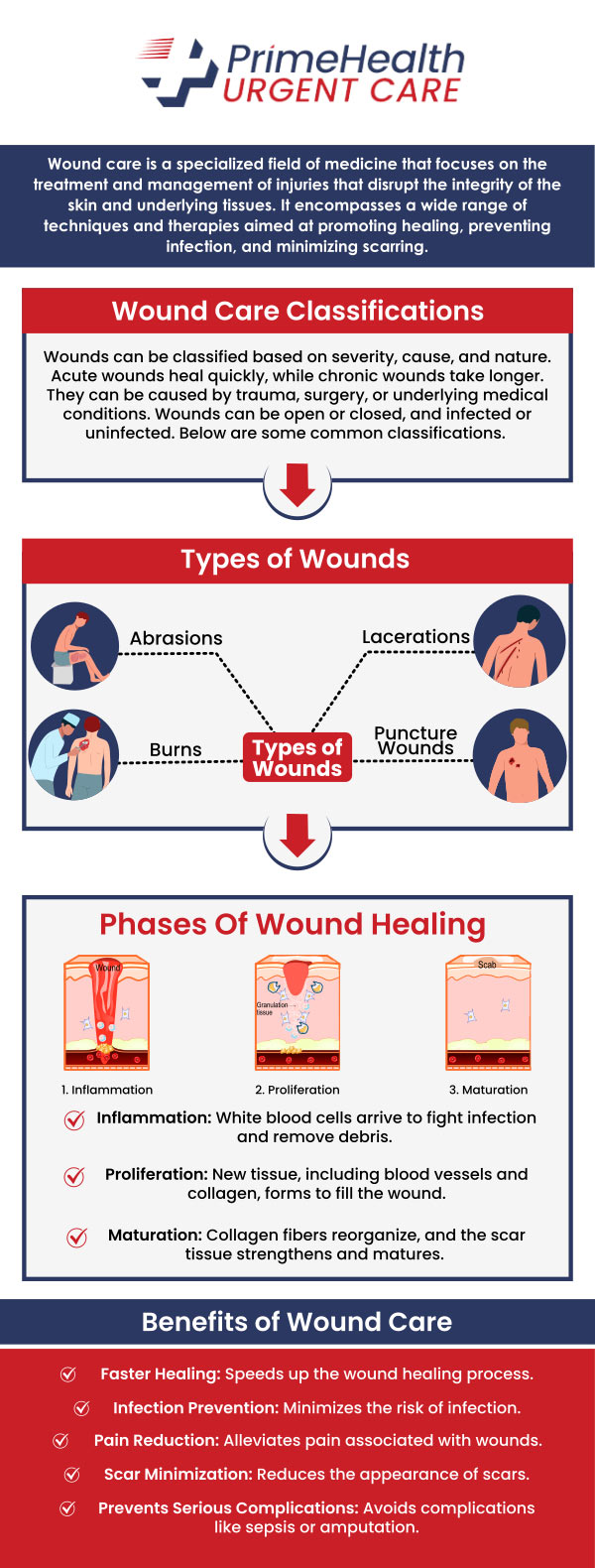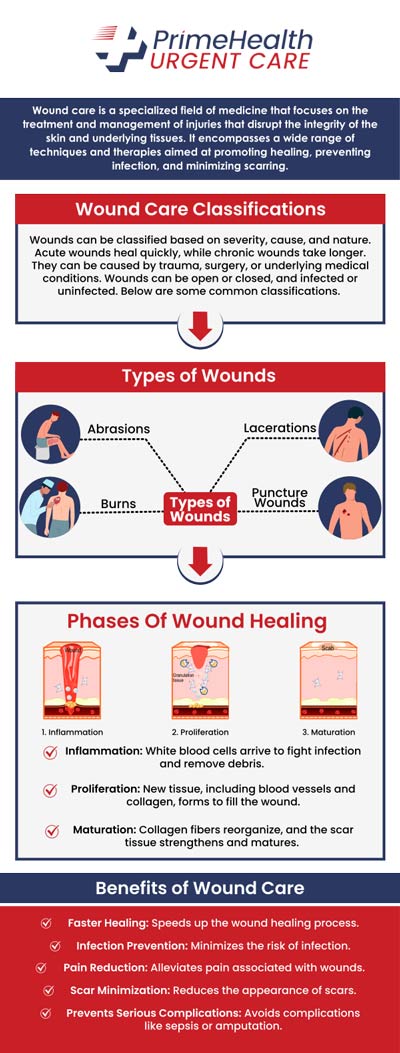Wound Care Treatment Doctor in Florida
A wound can sometimes take a very long time to heal or may become infected and cease healing completely. It’s essential to understand the phases of wound healing to determine whether your wound is healing properly. Get treatment for your wound today at PrimeHealth Urgent Care. For more information, please contact us or schedule an appointment online. We have convenient locations to serve you in Parrish, Bradenton, Sarasota, Lehigh Acres, Estero, Port Charlotte, West Bradenton, and Ellenton FL.




Table of Contents:
What does a wound care clinic do?
When should I see a wound care doctor?
What is the fastest way to heal an open wound?
If a wound has not begun to heal within 2 weeks or has not completely healed in 6 weeks, a visit to a wound care clinic may be in order.
Some wounds can take months to heal, while others never completely heal.
Commonly, when a wound occurs, red blood cells create collagen, which are white fibers that begin to form new tissue, called granulation tissue. New skin then begins to form over this tissue, and as the wound heals, the wound gets smaller as the edges pull inward.
Dead skin and foreign materials can interfere with the healing process. If an infection occurs, the body works to fight the infection, rather than heal the wound. Some people are at a greater risk of non-healing wounds, which include those with diabetes, anemia, cancer, heart disease, varicose veins, or other long-term health conditions.
Wound care clinics are medical facilities for treating wounds that do not heal. At a wound care clinic appointment, a doctor will examine and measure the wound, and determine what kind of a wound a person has.
The most common wounds are described as follows:
• Abrasion – A minor wound with minimal bleeding.
• Puncture wound – May or may not bleed, possible internal damage.
• Laceration – A deep cut in the skin, with usually heavy bleeding.
• Avulsion – Wound involves the removal of tissue, usually heavy bleeding.
Each wound type will require different types of care and management in order to heal properly, and all involve four primary stages of healing. If the healing process gets stuck at any of the four stages, the wound is considered chronic and will likely require advanced wound treatment.
The first stage of the process is immediate and called hemostasis, which is when blood clotting occurs to close off the wound and decrease blood loss.
The second stage is inflammation, which also occurs immediately, and is the beginning of the healing process.
Next is the proliferative stage, which involves the creation of new tissue, and the skin begins to heal and the wound size decreases.
The final stage is maturation, when the wound fully heals, and the skin begins to return to normal.
Having a chronic health issue can decrease the body’s ability to heal properly. Medications and other treatments can also impede the healing process. Some of the most common health conditions that affect the healing process include:
• Diabetes
• Cancer
• Pulmonary disease
• Heart conditions
• Thyroid diseases
• Gastrointestinal disorders
Health conditions, health history, and any medications taken are important factors to help determine why healing is not happening normally.
Chemotherapy and radiation can slow or stop the wound healing process, as can some anti-inflammatory medications or steroids.
Healing is the natural process the body undergoes when a wound occurs, however when a wound is not healing properly, a wound care clinician will follow the following steps to help ensure the wound heals as quickly as possible:
• Analyze the wound – determine the type and appearance of the wound and surrounding area (size, depth, amount, and type of drainage).
• Proper oxygenation – for a wound to heal, the blood needs proper oxygenation.
• Watch and treat – monitor for infection. Untreated infections can be fatal.
• Clean and cover – maintain the cleanliness of the wound and the wound covering.
If you have a wound that has not shown signs of healing over 2 weeks, visit our highly trained, and compassionate healthcare professionals at PrimeHealth Urgent Care. Our skilled team of medical professionals is trained in all forms of treatment of acute wound care. Contact our care center for more information, or visit our website to schedule an appointment. We serve patients from Parrish FL, Bradenton FL, Sarasota FL, Lehigh Acres FL, Estero FL, Ellenton FL, West Bradenton FL, Port Charlotte FL, Palmetto FL, Lakewood Ranch FL, Foxleigh FL, Venice FL, Fruitville FL, Wimauma FL, Balm FL, Fort Myers FL, Westminster FL, El Dorado Acres FL, Cascades FL, West Samoset FL, Memphis FL, Harbour Heights FL, Murdock FL, and surrounding cities.

Additional Services You May Need
- Abscesses
- Sports Injuries
- Bug & Animal Bites
- BV Testing
- COVID Testing
- Drug Testing
- EKG Testing
- Flu Shots
- Foreign Body Removal
- Laceration Repair
- Minor Burn Treatment
- Pelvic Exams
- Strep Testing
- STD Testing
- Illness/Injury
- Common Cold
- Auto Injuries
- Wegovy
- Respiratory Infection
- Coastguard Physicals
- Heat Exhaustion

Additional Services You May Need
• Abscesses
• Sports Injuries
• Bug & Animal Bites
• BV Testing
• COVID Testing
• Drug Testing
• EKG Testing
• Flu Shots
• Foreign Body Removal
• Laceration Repair
• Minor Burn Treatment
• Pelvic Exams
• Strep Testing
• STD Testing
• Fractures, Sprains, & Strains
• Splinting Treatment
• School & Sports Physicals
• TB Testing
• Tetanus Shot
• Urgent Care
• Vaccines
• Wound Care
• Work Injuries
• X-Ray
• Internal Lab Services
• Illness/Injury
• Occupational Medicine
• Employment Physicals
• Common Cold
• Auto Injuries
• Weight Loss
• Wegovy
• Mounjaro
• Telehealth
• Stitches
• Respiratory Infection
• Coastguard Physicals
• Sick Visits
• Sun Burns
• Heat Exhaustion
• Heat Stroke





